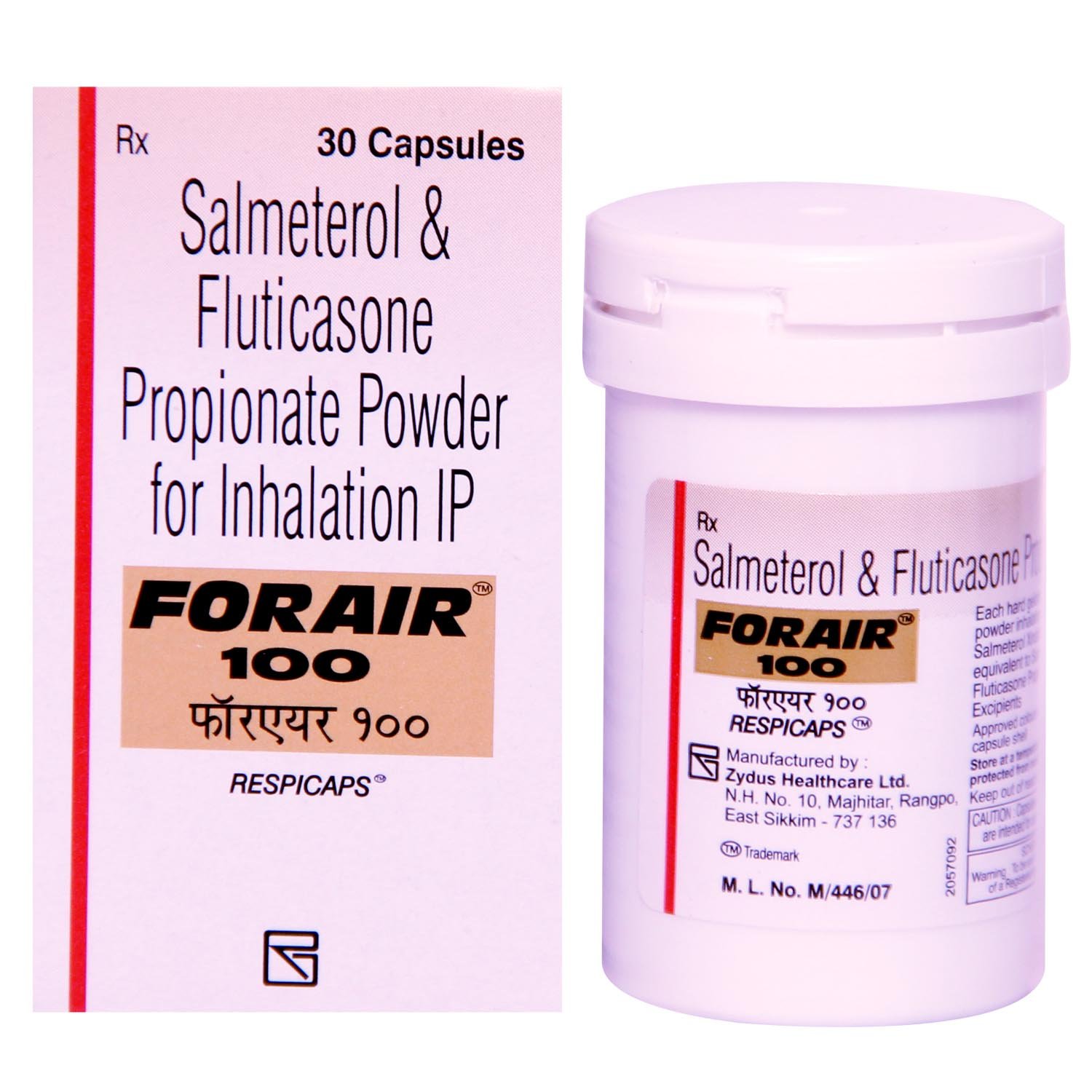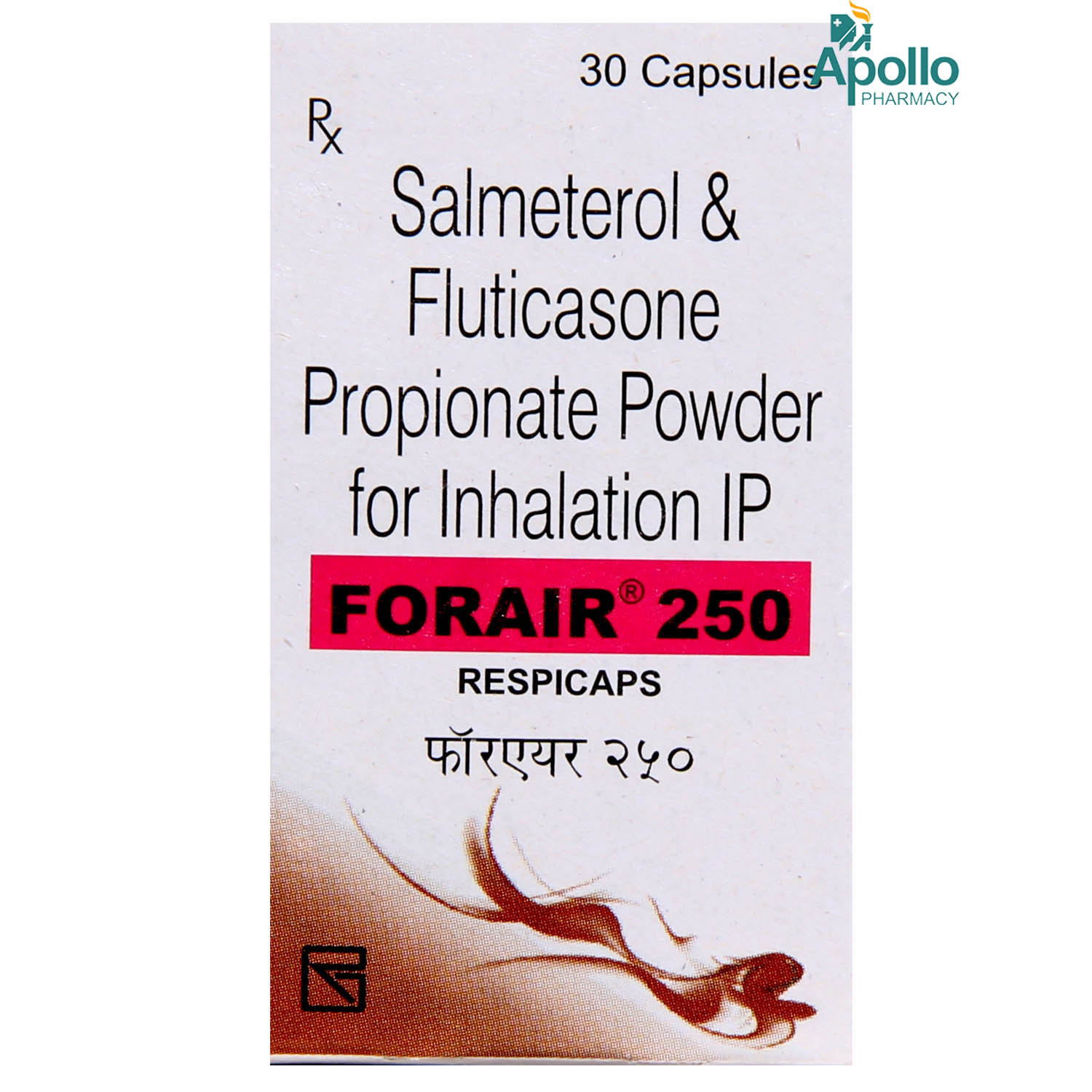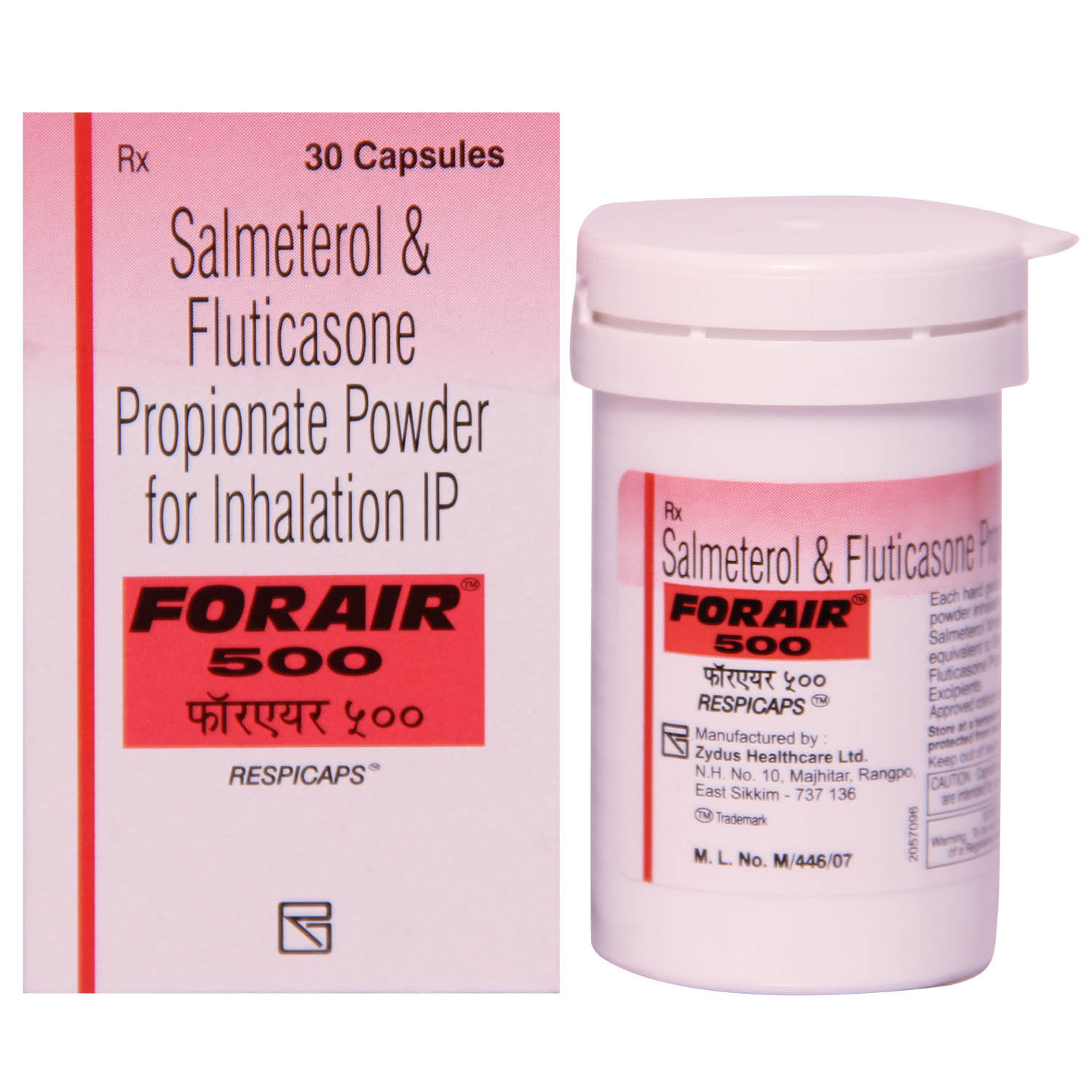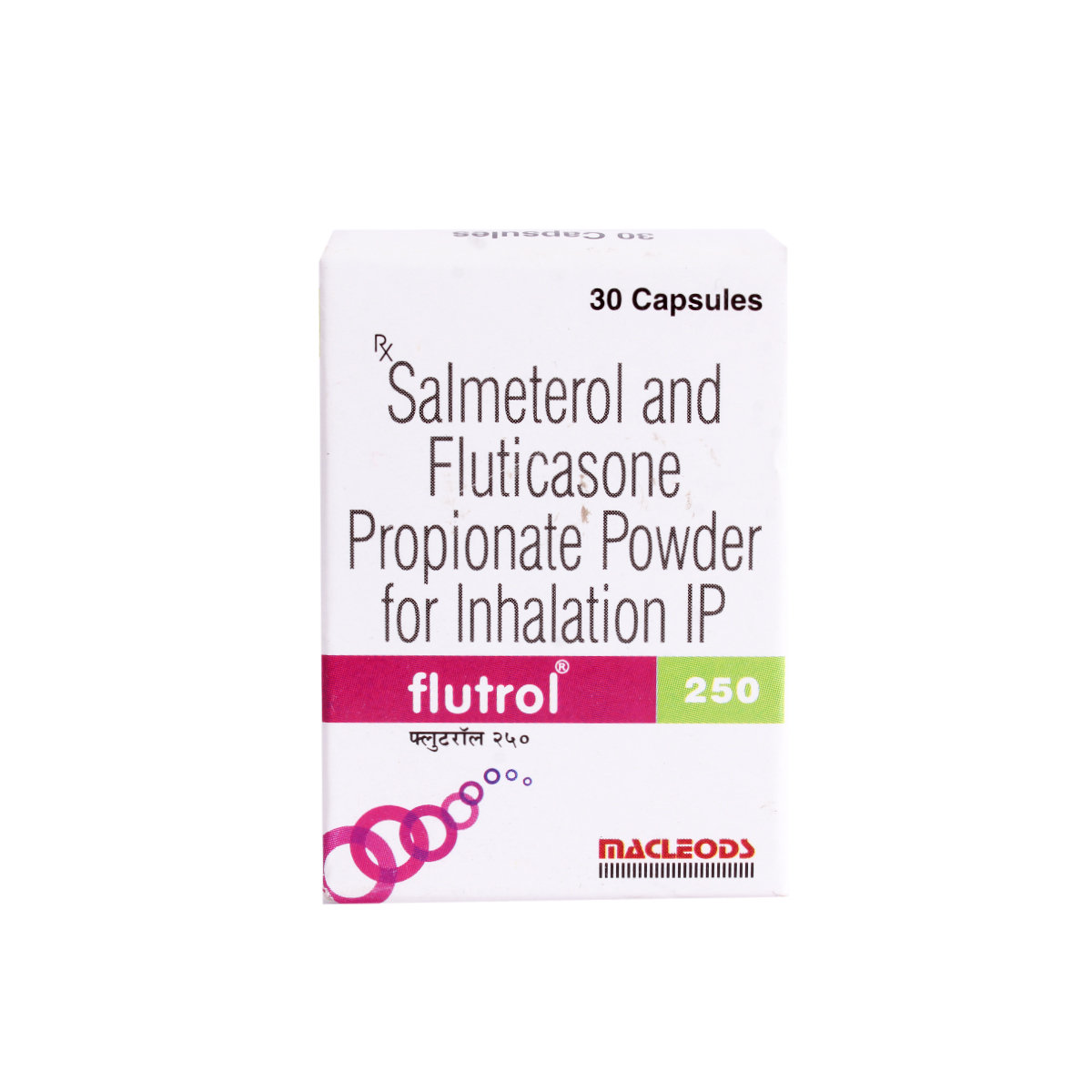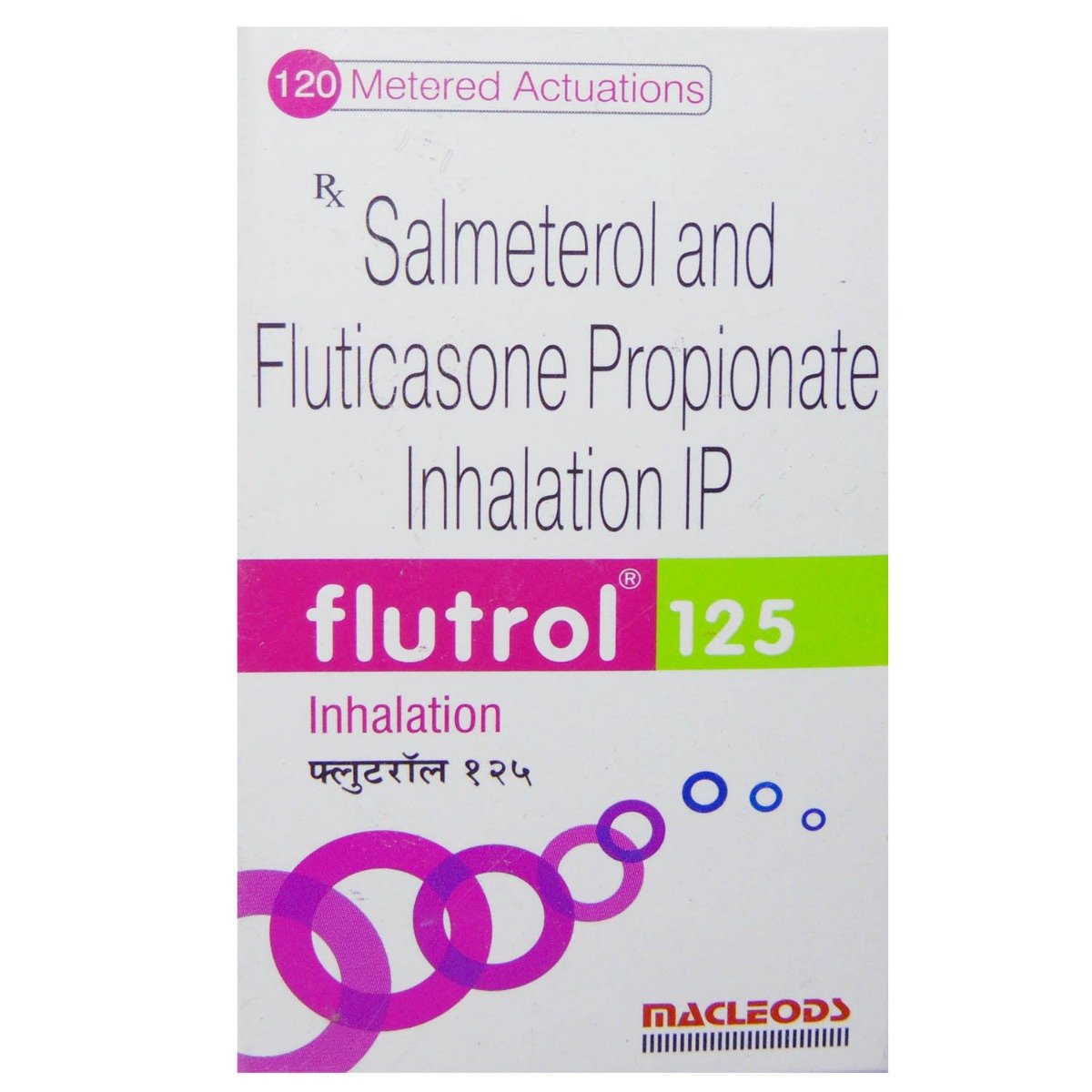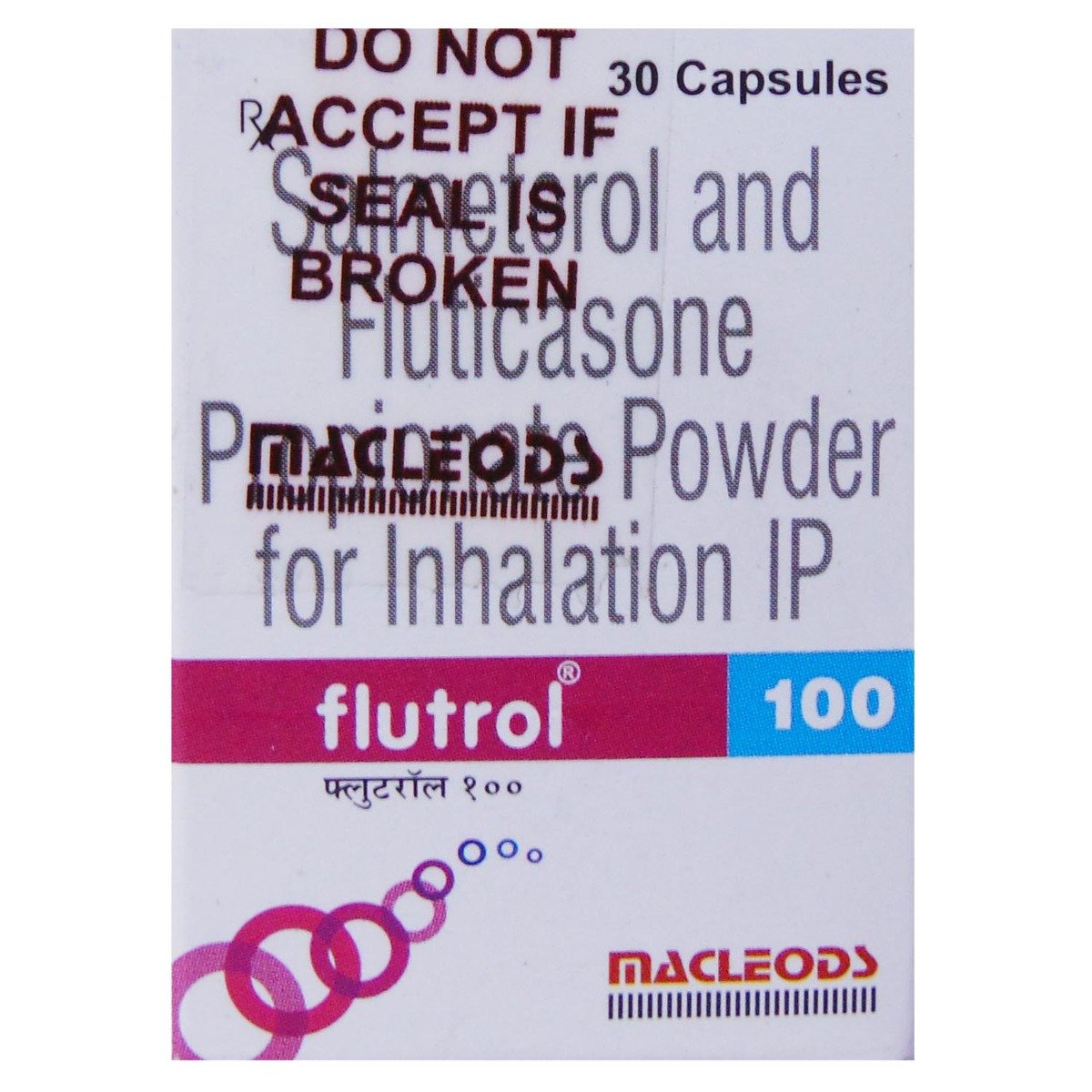Salmeterol+fluticasone
About Salmeterol+fluticasone
Salmeterol+fluticasone is a respiratory medication primarily used to treat and prevent respiratory disorders like asthma attacks and chronic obstructive pulmonary diseases (COPD). Asthma is a breathing problem in which airways narrow, swell, and produce extra mucus, leading to difficulty breathing. COPD is a group of lung diseases with emphysema (shortness of breath) and chronic bronchitis (inflammation of the lining of your bronchial tubes).
Salmeterol+fluticasone is a combination of two medicines, namely: Salmeterol (bronchodilator) and Fluticasone. Salmeterol is a long-acting bronchodilator that relaxes the muscles in the airways and increases airflow to the lungs. It makes breathing easier by widening the airways. Fluticasone belongs to the class of corticosteroids. It acts by blocking prostaglandins' production (chemical messengers) that cause inflammation (swelling) of the airways.
Your doctor will advise on how often you take Salmeterol+fluticasone based on your medical condition. The common side effects of Salmeterol+fluticasone include nausea, vomiting, respiratory tract infection, headache, sore throat, cough, bone, muscle or joint pain, increased heart rate, chills, black or tarry stools, and noisy breathing. Most of these side effects of Salmeterol+fluticasone do not require medical attention and gradually resolve over time. However, if the side effects are persistent, reach out to your doctor.
Try not to stop taking this medicine of your own. Brief your medical history to the doctor if you have heart, liver, kidney diseases, hypokalaemia (low potassium levels in the blood), hyperadrenocorticism (high levels of cortisol), eye disorders like cataract and glaucoma, seizure (fits), osteoporosis (weak and brittle bones), and diabetes before taking Salmeterol+fluticasone. Therapy with nasal or inhaled corticosteroids like Fluticasone should be cautiously administered in patients with a fungal, bacterial, parasitic, or viral infection and tuberculosis since there are chances of developing a secondary infection. Please check with your doctor if you are pregnant, currently breastfeeding, or taking any other prescribed or non-prescribed medicines.
Uses of Salmeterol+fluticasone
Medicinal Benefits
Salmeterol+fluticasone is used to treat and prevent respiratory disorders like asthma attacks and chronic obstructive pulmonary diseases (COPD). Salmeterol+fluticasone improves pulmonary function and effectively treats and prevents the worsening of emphysema (shortness of breath) and chronic bronchitis (inflammation of the lining of your bronchial tubes). Salmeterol+fluticasone is a combination of Salmeterol (bronchodilator) and Fluticasone (corticosteroid). Salmeterol relaxes the muscles in the airways and increases airflow to the lungs. It makes breathing easier by widening the airways. Fluticasone acts by blocking prostaglandins' production (chemical messengers) that cause inflammation (swelling) of the airways. Fluticasone has potent vasoconstrictive (narrowing of the blood vessels) and anti-inflammatory activity.
Directions for Use
Storage
Side Effects of Salmeterol+fluticasone
- Nausea
- Vomiting
- Respiratory tract infection
- Headache
- Sore throat
- Cough
- Bone, muscle or joint pain
- Increased heart rate
- Chills
- Black or tarry stools
- Noisy breathing
Drug Warnings
Do not stop taking this medicine of your own unless advised by your doctor. Before taking Salmeterol+fluticasone, let your doctor know if have a history of heart, liver, kidney diseases, hyperadrenocorticism (high levels of cortisol), eye disorders like cataracts and glaucoma, seizure (fits), osteoporosis (weak and brittle bones), and diabetes. Salmeterol+fluticasone causes hypokalemia (low potassium levels in the blood), therefore should be used with caution in patients with hypokalaemia to prevent any cardiovascular effects. Special precautions should be taken in patients with a fungal, bacterial, parasitic, or viral infection and tuberculosis since nasal or inhaled corticosteroids like Fluticasone can cause secondary infections. Salmeterol+fluticasone can cause a rise in blood glucose levels. Hence monitor your blood glucose levels regularly if you are diabetic. Please let your doctor know if you plan to become pregnant or are already pregnant and a lactating mother. Do not drive or operate machinery if you experience drowsiness and increased/uneven heart rate while using Salmeterol+fluticasone. Avoid drinking alcohol while taking this medicine as it can worsen your side effects.
Drug Interactions
Drug-Drug Interaction: Salmeterol+fluticasone may interact with fluid retention drugs (furosemide), corticosteroids (budesonide), bronchodilators (vilanterol, formoterol, albuterol), respiratory drugs (ipratropium), and blood pressure medicines (metoprolol).
Drug-Food Interaction: Limit alcohol intake since it may cause a rise in blood pressure leading to heart diseases.
Drug-Disease Interaction: Let your doctor know if you have any allergic reactions to medicines, heart, liver, kidney diseases, hyperadrenocorticism, cataracts, glaucoma, hypokalaemia, fungal, bacterial, parasitic, or viral infection, and tuberculosis.
Drug-Drug Interactions Checker List:
Safety Advice

Alcohol
cautionAvoid drinking alcohol while taking this medicine as it can worsen your side effects.

Pregnancy
cautionPlease consult your doctor if you are planning to conceive or are already pregnant before starting Salmeterol+fluticasone.

Breast Feeding
cautionThere is limited data on how Salmeterol+fluticasone affects breastfeeding. Please consult your doctor before starting Salmeterol+fluticasone.

Driving
cautionDo not drive or operate machinery if you experience drowsiness and increased/uneven heart rate while using Salmeterol+fluticasone. This may affect your ability to drive. Seek medical attention if the symptoms persist longer.

Liver
cautionSalmeterol+fluticasone should be used with caution in patients with liver diseases. Let your doctor know if you have any history of liver diseases or hepatic impairment. Your doctor will weigh the benefits and potential risks before prescribing Salmeterol+fluticasone.

Kidney
cautionSalmeterol+fluticasone should be used with caution in patients with kidney diseases. Let your doctor know if you have any history of kidney diseases. Your doctor will weigh the benefits and potential risks before prescribing Salmeterol+fluticasone.

Children
cautionSalmeterol+fluticasone is not recommended for use for children less than four years of age. The dose may have to be adjusted by your doctor depending upon the condition of the child's disease and age.
Habit Forming
Diet & Lifestyle Advise
- Take the medication as directed by the doctor and at regular intervals. Do not use other over the counter medications, herbal or vitamin supplements without informing your pharmacist or doctor when you take Salmeterol+fluticasone.
- Know your triggers like allergens, such as pollen, dust, and food items that make your asthma severe.
- Quit smoking and avoid passive smoking. Smoking also reduces the effectiveness of the medicine.
- Eat a healthy diet and exercise regularly to strengthen your breathing muscles and boost your immune system.
- Learning breathing exercises will help you move more air in and out of your lungs.
Special Advise
- It is advised to undergo blood examination to keep a check on your potassium levels since Salmeterol+fluticasone can cause low potassium levels in the blood (hypokalaemia).
- Regularly monitor your blood sugar levels while using Salmeterol+fluticasone since bronchodilators like Salmeterol can cause low blood glucose levels.
- Consult your diabetologist if you have diabetes before using Salmeterol+fluticasone so that your insulin or other diabetic medication can be adjusted accordingly to maintain your blood sugar levels.
Patients Concern
Disease/Condition Glossary
Asthma: It is a chronic (long-term) respiratory condition in which airways narrow, swell, and produce extra mucus, leading to difficulty in breathing. The symptoms of asthma include wheezing (whistling sound while breathing), shortness of breath, chest tightness and cough, especially at night. The symptoms of mild persistent asthma may occur more than 2 times in a week and up to 4 nights in a month whereas, in case of severe persistent asthma, the symptoms occur several times every day and most nights. The treatment for asthma includes medication, breathing exercises and self-care.
Chronic obstructive pulmonary disease (COPD): It is a group of lung diseases with emphysema (shortness of breath) and chronic bronchitis (inflammation of the lining of bronchial tubes). The major cause of COPD is smoking tobacco. Also, long-term exposure to fumes and chemicals may also lead to COPD. The symptoms include chronic cough, shortness of breath or wheezing (whistle sound while breathing).
FAQs
Salmeterol+fluticasone is used to treat and prevent respiratory disorders like asthma attacks and chronic obstructive pulmonary diseases (COPD). Salmeterol+fluticasone consists of Salmeterol (bronchodilator) and Fluticasone (Fluticasone). Salmeterol relaxes the muscles in the airways and increases airflow to the lungs. Fluticasone acts by blocking prostaglandins' production (chemical messengers) that cause inflammation (swelling) of the airways.
Salmeterol+fluticasone should be cautiously administered under the doctor's guidance in seizures since bronchodilators like Salmeterol can cause central nervous system stimulation that can lead to other adverse conditions. Please consult your doctor before using Salmeterol+fluticasone if you have seizures.
Salmeterol+fluticasone contains bronchodilator (Fluticasone), which can cause a rise in blood glucose levels. Hence therapy with Salmeterol+fluticasone is cautiously administered in patients with diabetes. Please monitor your blood glucose levels regularly and inform your doctor so that the dose can be adjusted accordingly.
Bronchodilator (Salmeterol) in Salmeterol+fluticasone may decrease the potassium levels in your body, therefore should be used with caution. Please consult your doctor before taking Salmeterol+fluticasone since low potassium levels can lead to other cardiovascular problems in patients with hypokalaemia.
Take the missed dose as soon as possible. However, if it is time for the next dose, skip the missed dose and go back to your regular dosing schedule.

